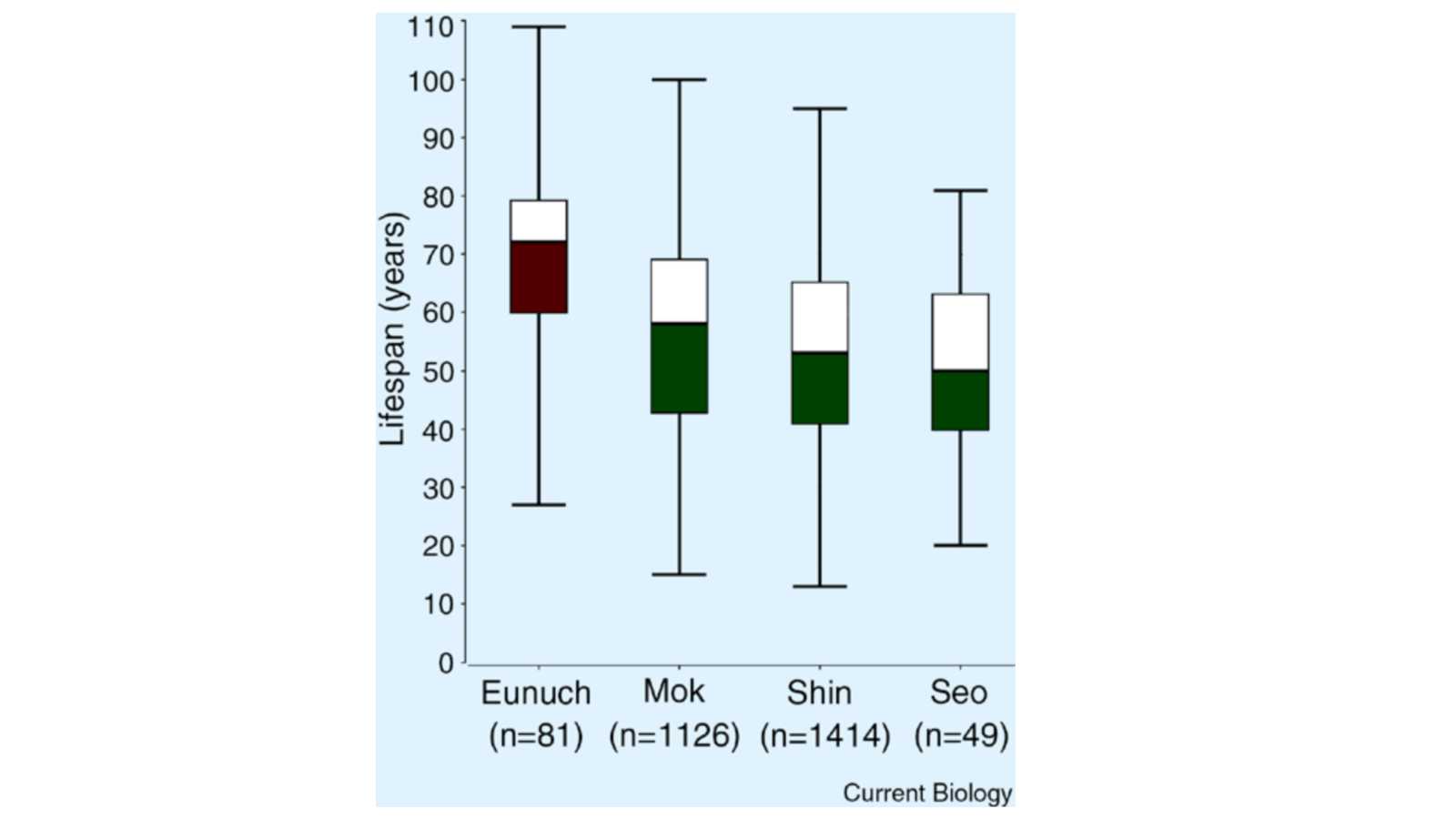Castration prolongs lifespan Castrate?
According to a paper entitled “The Lifespan of Korean Eunuchs” (Current Biology Vol 22 No 18 R792 2012),
Many papers have pointed out the relationship of trade-offs between longevity and reproduction. In many species, including humans, females live longer than males due to the effects of not male but female hormones. Cutting off the source of male hormones has been found to extend the lifespan of males in many animals. In order to investigate whether it is the case in humans, researchers investigated the eunuch family line in the Korean past record. In the eunuch families maintaining the lineage, a study of the documented life expectancy of 81 eunuchs in this family found an average life expectancy of 70 ± 1.76 years, 14.4-19.1 years old when compared to comparable non-castrated families. One of the leading theories is that male hormones suppress the immune system, shortening life expectancy. The family tree, the Adoptive Genealogy, was published in 1805 by the 13th Yoon Muk Lee. Authors have confirmed that this record is consistent with the Joseon Royal Family Chronicle of the Joseon Royal Secretariat, and not only records of life and death, but also their activities were recorded as well.
The life spans of 81 of the 385 eunuchs in this record were identified and analyzed. As shown in the figure, the average life expectancy was 70.0±1.76 years, with the shortest life expectancy of 27 years and the maximum life expectancy of 109 years. Since lifespan is affected by genetic, social, and economic factors, they selected three ordinary non-eunuch families of the same social status who lived at the same time as controls. The average life expectancy of these three families is 50.9-55.6 years, the shortest in the Mon family is 15 years old and the longest is 100 years old, the shortest in the Shin family is 13 years old and the longest is 95 years old, and the shortest in the Seo family is 20 years old and the longest is 81 years old. Life expectancy was significantly longer in eunuch families. Also, when arranging the life expectancy of each family line from short to long, if you plot 25% to 75% as boxes, the length of the box is equivalent to 19 years in eunuch families, which is the most compact fit. In addition, 3 out of 81 eunuch family members are 100 years old, which is 130 times the rate of 100 years old in modern developed countries. The average life expectancy of kings and royalty was 47±3.21 years and 45±2.79 years, respectively. Another study reported that castrated male patients admitted to a psychiatric hospital lived 14 years longer than uncastrated male patients admitted to the same hospital (69.3 vs. 55.7) and eunuch family research results (70 vs. 50.9-55.6) were in good agreement.
Reported in the American paper “Age at Menarche and Menopause and Reproductive Lifespan As Predictors of Exceptional Longevity in Women: The Women’s Health Initiative” (Menopause. 2017 January; 24(1): 35–44.) In a study of 16,251 women with an average age of 74.7, 8,892 lived to be 90 years or older. 10% more women who had their first menstrual period after the age of 12 lived to be over 90 years old compared to those who had their first menstrual period before the age of 12, and 20% more women who had menopause after the age of 55 lived to be over 90 years old compared to those who were less than 40 years, more than 10% of those who have been able to bear children for 40 years or more lived to be over 90 years old compared to those who were for 33 years or less.
Thus, male and female hormones are closely related to human lifespan. Estrogen and DHEA, which appear in supplements, are products related to this, but I will investigate whether these are effective or not.
